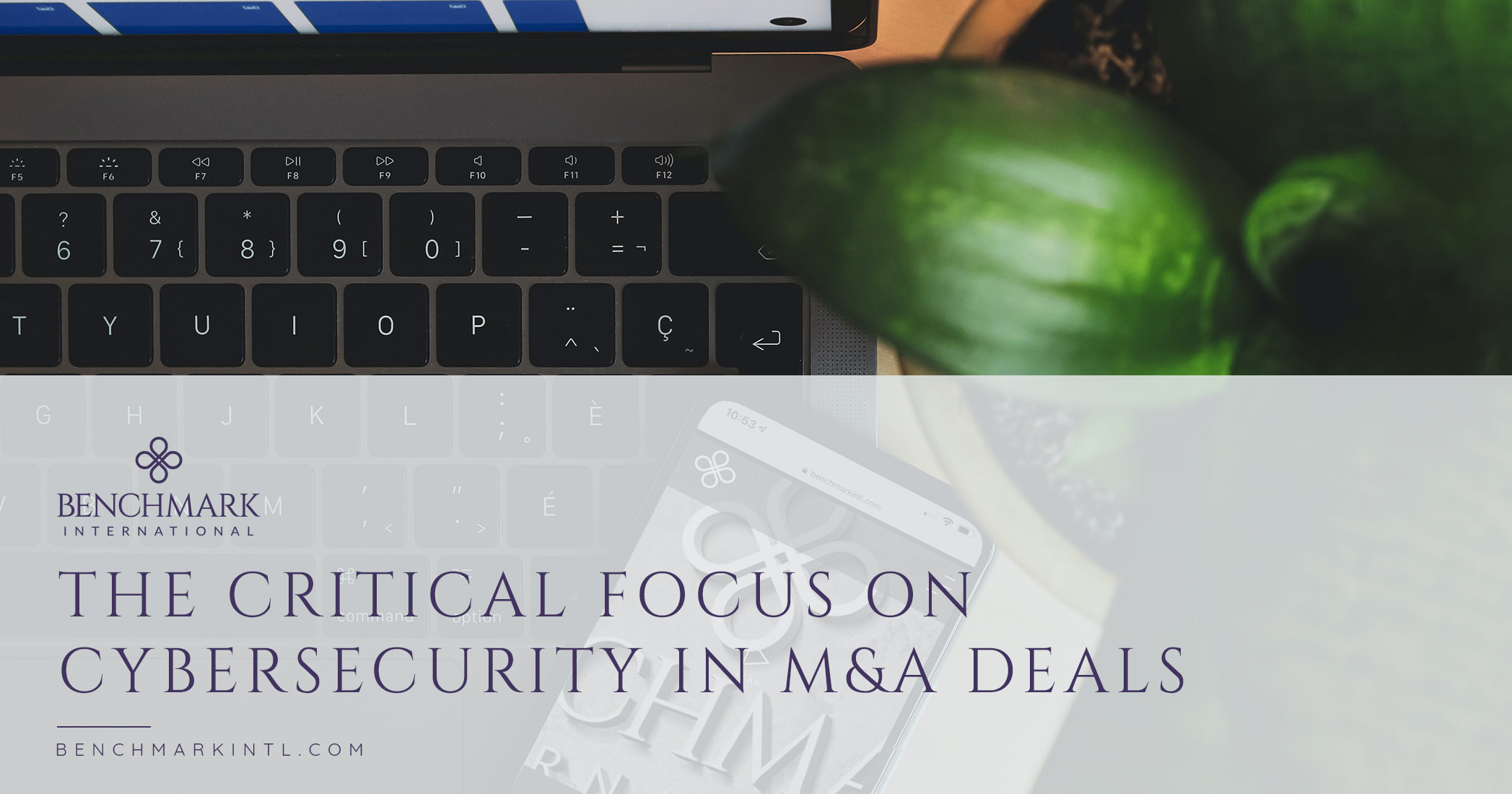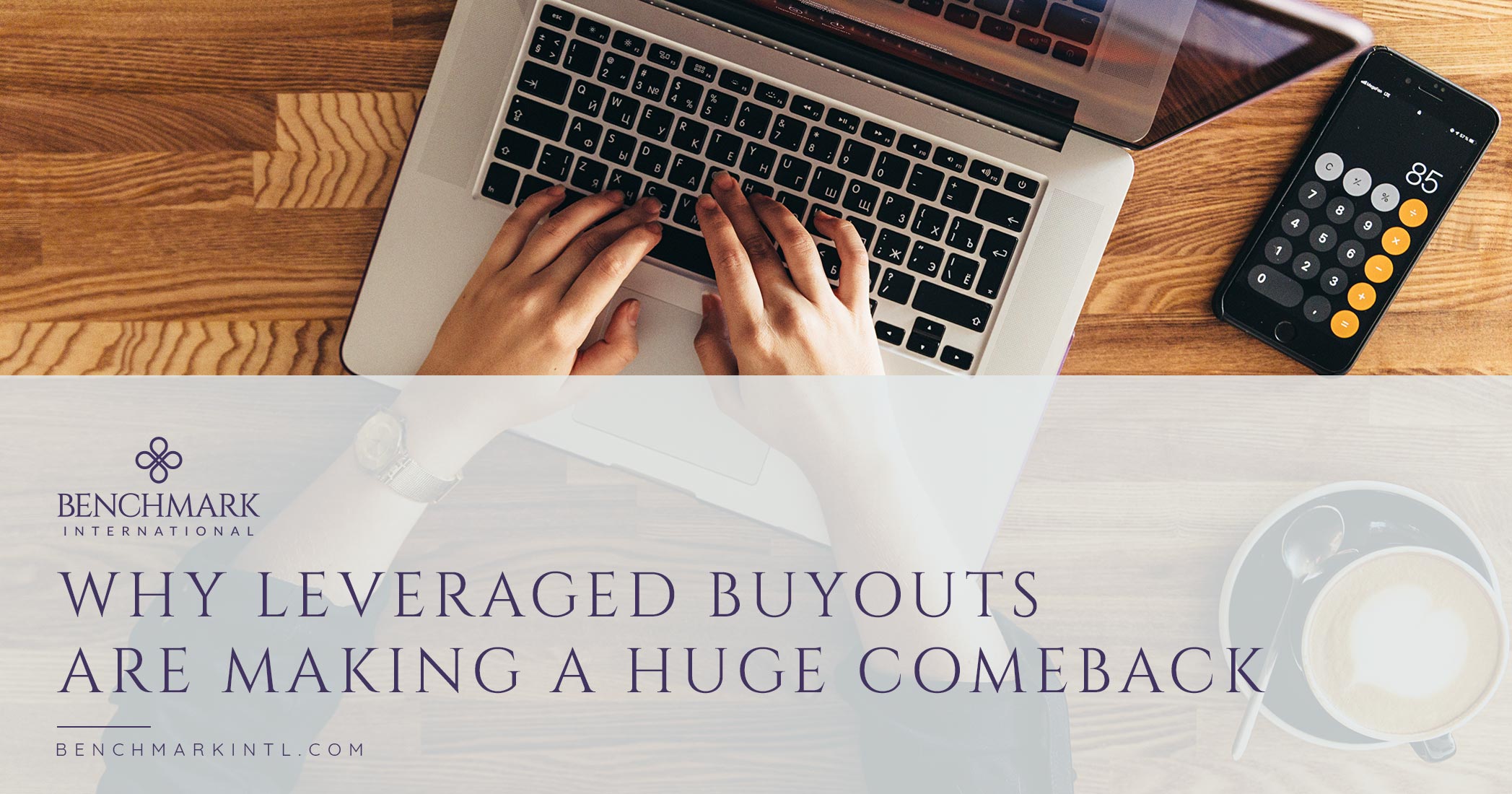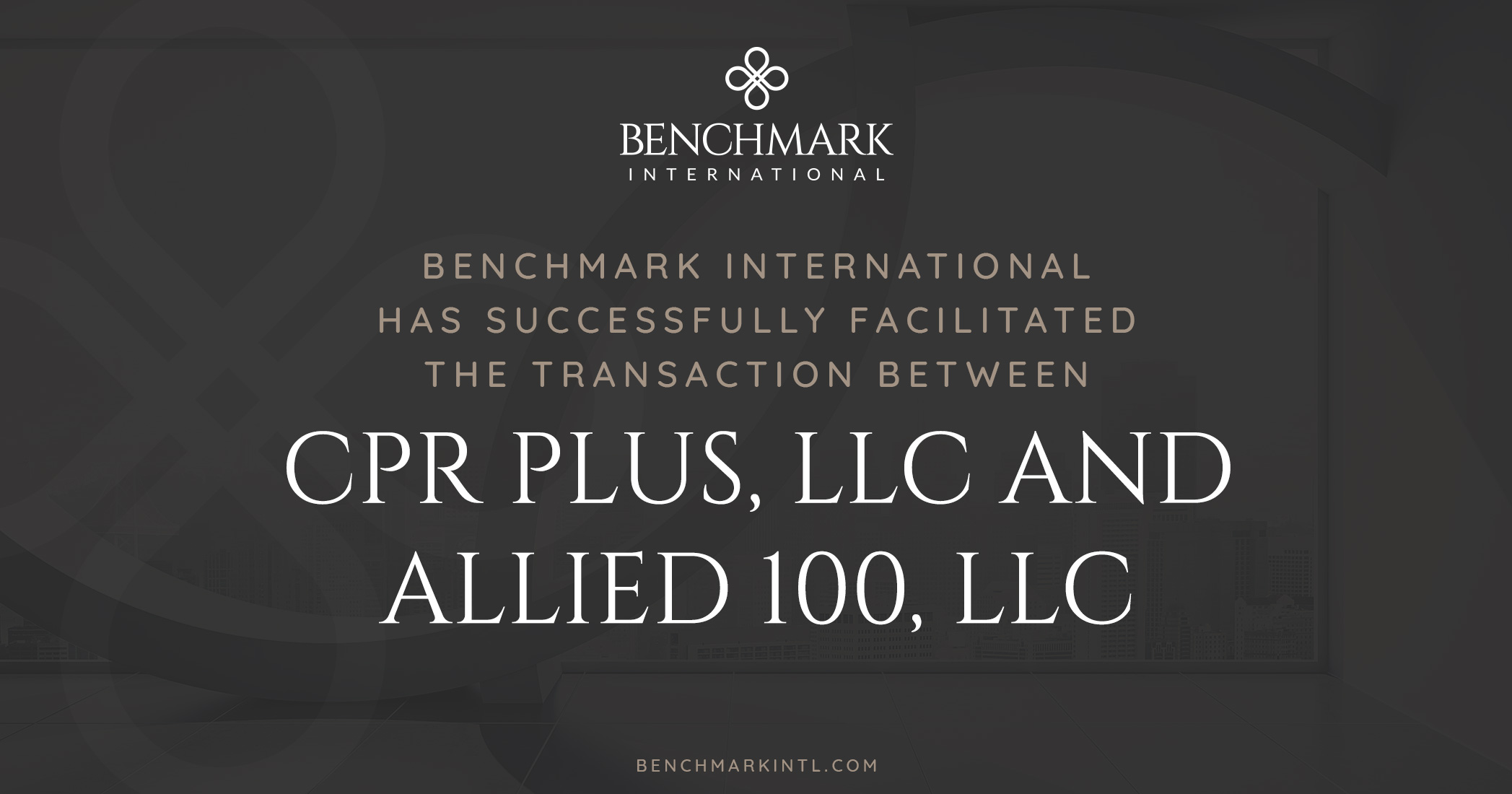The COVID-19 pandemic disrupted normalcy in several aspects of the world as we knew it, and one of the things hit especially hard has been the global supply chain. These supply chain problems have impacted nearly every industry and business, both large and small. Because of so much continued uncertainty in supply chains—uncertainty that is expected to last for years—business owners and executive leaders are reassessing operations and seeking paths to gain more control.
READ MORE >>Archives
Supply Chain Issues Are Fueling M&A Transactions
Acquiring A New 401(k) Plan In An M&A Transaction
There are basically four possible outcomes for retirement plans in an M&A deal:
- The plans of both companies are merged.
- The plan at the acquired company is terminated.
- Both plans from both companies are maintained.
- The plan from the acquired company is frozen.
So, what do you need to know if these circumstances apply to a deal that you are involved in?
READ MORE >>Share this:
Benchmark International Successfully Facilitated the Transaction Between Perfusion.com, Inc. and Epic Healthcare Travel Staffing, Inc.
Perfusion.com (PDC) is the leading provider of staffing services to the U.S. perfusion industry. The company’s core perfusion staffing services include autotransfusion, blood management and biologics services, the sale of disposables, capital equipment leasing, training and education services and patient transportation. The company is headquartered in Fort Myers, Florida.
READ MORE >>Share this:
Proposed Changes to U.S. Section 1202 Tax Reform: What You Need to Know
WHAT IS SECTION 1202?
In the United States, Section 1202 is known as the Small Business Stock Gains Exclusion. It is a section of the IRS code that allows capital gains from Qualified Small Business (QSB) stock to be exempt from federal taxes when selling. But not all small business stocks qualify:
Share this:
Benchmark International Awarded M&A Deal of The Year (100M - 250M)
At the 20th Annual M&A Advisor Awards, Benchmark International was awarded M&A Deal of the Year (100M-250M) for the acquisition of PBK Architects by DC Capital Partners.
As the 23rd largest US-based architecture firm, PBK, based in Houston, Texas, and its subsidiaries in California, Beijing, Shenzhen, and Hong Kong, employ more than 500 architects, engineers, and related professionals.
In addition to its Top 25 status, in 2019, PBK was ranked as the “#1 Education Design Firm” by Engineering News-Record (“ENR”), widely regarded as the engineering and design industry’s premier publication. Specializing in K-12 projects and, in particular, large public high schools, PBK has long been the go-to firm for sustainable design and next-gen integrations in particular. The company also focuses on two related building types—higher education and sports facilities.
This transaction followed closely on the heels of 11 other deals that Benchmark International closed in the architecture, engineering & construction (AEC) space in the first half of 2020.
Share this:
Benchmark International Named Investment Banking Firm of The Year
At the 20th Annual M&A Advisor Awards—known as the Oscars of the M&A world— Benchmark International was awarded Investment Banking Firm of the Year. The awards are presented by The M&A Advisor, and the winners were announced at the Gala Ceremony live event held in New York City on November 17, 2021.
Benchmark International beat out the other nominees, which included Capstone Partners, Clearsight Advisors, DC Advisory, Drake Star Partners, Generational Group, Leonis Partners, and Raymond James.
These awards serve as the industry benchmark for dealmaking excellence, recognizing the leading M&A transactions, restructurings, deal financings, products/services, firms, and professionals.
Share this:
A Full or Partial Business Transition: Which is Right For You?
Every company has its own unique circumstances and needs. As a business owner, you can choose from a number of different ways to transition out of your company in a sale or before retirement. When succession planning, you should consider your goals for both the company and your life after the transition, such as financial requirements and how much you want to remain involved in the business. Adequate succession planning ahead of time can also help to create significant value for your company.
A transition of a business can be internal or external. Under an internal transition, the company is usually passed on to the next generation of family or a management team member. In an external transition, a strategic or financial buyer purchases the company, either completely or partially. There is also the option of an employee stock ownership plan (ESOP), which falls somewhere in between an internal and external transition.
Full Business Transition
A complete transition occurs when 100% of company ownership is sold to an investor, such as a strategic buyer or private equity firm. Under a full sale, there is a complete change in ownership control, either as a stock deal or asset purchase. Complete transitions are most often asset purchases because it assuages certain liabilities from the buyer. The owner could be required to stay involved with the business through a transition period that can range from months to years, especially if they are a key part of management.
Business valuations in a full transition are based on competitive negotiations. In many sectors, a multiple of the company’s EBITDA (earnings before interest, taxes, depreciation and amortization) and factors such as size, profitability, industry, customer base, and location. In a complete sale, the seller is often given the majority of transaction proceeds upfront, with the rest paid later through an earn-out or seller note.
Share this:
U.S. Private Equity in Middle Market Continues at Record Levels
Middle-market private equity (PE) dealmaking in the United States didn’t lose its record momentum in the second quarter of 2021, some of which carried over into Q3, thanks to sustained economic recovery, ample debt, and plenty of available capital, according to data from Pitchbook. U.S. GDP grew at an annualized 6.5% in Q2 but slowed to 2% in Q3, mainly due to global supply chain issues.
PE fundraising is also holding strong, with the 87 U.S. middle-market funds raised so far this year on course to set a new record. Additionally, the $68.4 billion in capital raised in 2021 is on track to be the second-highest annual total since 2010.
Most deal activities were put on hold for several months after March of 2020 and the onset of the COVID-19 pandemic, but 2021 and early 2022 may be the right time to sell. The following factors are affecting the viewpoint of sellers of privately-owned companies:
- Some owners are now more heedful of another crisis and how it could affect their businesses.
- Many owners no longer wish to sustain efforts and risks that come with their businesses.
- Owners who worked remotely during the pandemic got accustomed to more flexible schedules and free time.
- Numerous owners nearing retirement are worried about the possibility of higher corporate, personal income, capital gains, and dividend taxes.
- Because wealth built up in private companies is not easily converted to cash, some owners have focused on the fact that after-tax proceeds from a sale will last for a long period of time.
So far this year, the largest share of PE deals has taken place in the lower to middle markets, with deals of less than $1 billion making up nearly 70% of all deals. 2021 remains on pace to easily surpass the prior annual record from 2019. At the end of the year, numbers are expected to be even more impressive as investors may hurry to close deals before the year comes to a close.
According to the Golub Middle Market Index, U.S. middle-market companies registered 21% revenue growth in the third quarter of this year. In addition, direct lending funds account for most middle-market LBO financing and reached record fundraising levels in the second quarter.
Add-ons increased as a share of PE deals. Middle-market firms looked to add mid-sized aggregators and sought out M&A deals to expand platforms, diversify the value chain, and embrace ESG principles.
There was also robust exit activity in the middle market, as valuations were desirable and investor confidence was high. So far this year, the market hosted an estimated 430 exits with a combined value of $87.3 billion. Soaring valuations mean that many GPs meet their investment goals earlier than expected, driving many to cash in on investments ahead of schedule.
Smaller, strategic exits are dwindling in the hospitality and travel sectors for expected reasons after the pandemic impacts. Middle-market sponsors are holding onto investments in these pandemic-stricken sectors. In the second quarter of 2021, there were almost zero exits of hotels, in-person dining, travel providers, or other related companies.
Secondary buyouts are also following an upward trend. So far this year, SBOs account for nearly 62% of all middle-market exits. Buyout firms are taking advantage of limited partners’ healthy appetite for private market exposure as well as the record deal activity that enabled firms to fundraise at a very fast pace. While first-time funds and emerging managers put up positive numbers in 2021, some bigger LPs put less investment into large multi-strategy firms or shifted it to new products offered by those with whom they already had a relationship.
Even amid all this positive activity, middle-market firms in the U.S. are still facing other challenges. While unemployment rates have improved from 2020, there is still a record number of unfilled jobs, causing major labor shortages in sectors such as manufacturing, healthcare, and hospitality. These circumstances are causing firms to focus more on deals that acquire key talent and automated technologies that help with employee management and retention. The sector of senior care has been hit particularly hard by labor shortages, which is likely to result in increased consolidation by home care platforms. Additionally, insurance brokerages, wealth management firms, and registered investment advisors (RIAs) all witnessed record M&A activity in the first half of this year.
PE firms are also pursuing more intricate opportunities to expand lines of business, end-market exposures, and product value chains. Such game-changing add-on acquisitions can be especially effective for vertical software deals because complementary products can be woven into multi-capability platforms to create all-in-one solutions that are good for customer retention.
Deal activity is also being driven by environmental, sustainability, and governance (ESG) initiatives. ESG has moved into the forefront for businesses this year. Transactions in the renewables market represent middle-market opportunities to grow a platform into a sector leader because of the market’s highly fragmented nature. Firms in the middle market are also pursuing add-on acquisitions to better align their portfolio companies with sustainability initiatives, whether to meet changing consumer sentiment or lower capital costs by lowering carbon emissions.
READ MORE >>Share this:
Benchmark International Named Among The 50 Best Workplaces Of The Year
Benchmark International has been named as one of the 50 Best Workplaces of the Year 2021 by The Silicon Review. The list is handpicked from different areas and recognizes businesses that attract both talent and clientele and stand out with regards to unique and positive company culture.
READ MORE >>Share this:
The Benefits of an Effective Seller Transition Period
A very important part of selling your business occurs after the business has been sold. The transition period, also known as the handover period, begins when the exiting owner remains with business for a period of time to assist the new owner with taking control of the company. The transition period should be carefully planned and thought through in order to ensure that it is well executed when the time comes. It can make a great deal of sense to begin working on these details early on in the sale process.
READ MORE >>Share this:
Reps and Warranties Insurance is Now Key for Strategic Buyers
Reps and warranties insurance is a policy secured for corporate transactions such as mergers and acquisitions. In recent years, the amount of this type of insurance sold has increased significantly. It covers the indemnification for certain breaches of the representations and warranties in transaction agreements, either partially or in full. Reps and warranties insurance usually doesn’t cover losses for breaches of covenants (other than pre-closing tax indemnification) or purchase price adjustments.
READ MORE >>Share this:
The Impact of U.S. Infrastructure Investment on M&A
The U.S. Senate recently passed the $1.2 trillion bipartisan infrastructure bill, titled the Infrastructure Investment and Jobs Act (IIJA), to improve the country’s roads, bridges, and utilities. The bill does face an uncertain future in the House of Representatives, where its support is more limited. Still, the Democratic Party could use the reconciliation process to get the bill passed into law.
The bill includes:
- $73 billion for electric grid and power infrastructure
- $66 billion for passenger and freight rail
- $65 billion for broadband investments
- $55 billion for water systems and infrastructure
- $50 billion for Western water storage
- $39 billion for public transit
- $25 billion for airports
- $21 billion for environmental remediation projects
- $17 billion for ports and waterways
- $15 billion for electric vehicles
- $11 billion for road safety
So, what might this all mean for M&A?
READ MORE >>Share this:
The Latest Sales Trends Heading Into 2022
Every business owner should be keeping up with the top sales trends being used to boost companies’ bottom lines in today’s tech-driven economy. So what does the future hold? Use these sales trends insights to make sure you’re doing every last thing you can to take your business to the next level.
Social Selling
Over the last decade, selling has evolved immensely. More than 90% of consumers do online research before buying something these days. And that’s why social selling is becoming so integral to the sales process. Social media connects you with consumers already interested in what you do, so you already have the upper hand by simply having them as an audience. You are also able to build better relationships with them, which will translate to higher customer retention rates.
And don’t forget about the power of referrals. 70% of companies have reported that referrals convert faster than any other type of lead. If your consumers are happy with what you are doing, they will be more likely to recommend you to their friends and family—something that social media makes it easy to do in just a click or two.
Social selling also comes with a few other added benefits. It increases your brand visibility by actively engaging with people online, and it also keeps your brand top of mind. This means you get higher-quality leads. And with high-quality leads, you can expect to see higher sales numbers.
Value-Based Selling
Customers are savvier than ever. They can see through gimmicks. Simply shoving deals in their faces doesn’t work so well anymore, especially in the B2B sector. This is where value-based selling comes in.
Data shows that 87% of high-growth companies use the value-based approach, and with good reason. By focusing more effort on showing customers the direct benefits or personal value they can enjoy from using their products or services, you’re more likely to close more deals.
Artificial Intelligence (AI)
AI adoption for sales teams is projected to be at 139% for the next three years. This is because business leaders are realizing how it can make a massive impact on sales numbers by helping with processes and tasks. Did you know that AI is capable of performing 40% of sales tasks?
AI can help you gather valuable data on customers that you can use to craft marketing strategies to increase your sales. It can also provide value by offering suggestions to customers based on their recent transactions. But that’s not all. AI can also predict trends in your sector to help you stay ahead of the game, boost productivity by automating menial tasks, identify leads with a higher chance of conversion, and improve customer satisfaction.

Personalized Customer Experience
When you give your customers a more personalized experience, they are more likely to do business with you. Research shows that nearly half of all buyers will make an impulse purchase after getting a personalized shopping experience. Because most customers appreciate a level of personalization, they are willing to give you their personal information or create online profiles. And this is really half the battle when it comes to building a solid customer base. Additionally, when customers feel more engaged on your website or app, they are more likely to do business with you. As long as you can offer them convenience, speed, helpfulness, and friendly service, getting personal can take you a long way.
Outsource Sales
80% of logistics leaders have reported that the matter of outsourcing is no longer a yes or no question—it’s just a question of how much needs to be outsourced. The global outsourcing market is projected to grow to $82.2 billion by 2022.
By outsourcing, you will have a dedicated sales team that is laser-focused on identifying leads, reaches different segments through different platforms, and converts potential customers. Meanwhile, your company saves money and gets the sales expertise needed for the job while you focus more on your business. Outsourcing can also help small businesses with scalability issues. If your company experiences rapid growth, an outsourced sales team is ready to handle it.
Customer Relationship Marketing (CRM)
91% of companies in North America have a functional CRM solution integrated into their system. And guess what else? 65% of sales reps using mobile CRM have a higher chance of meeting their quotas. CRM makes it easy for reps to see all the data they need in a centralized system. Because it also stores customer data, CRM can suggest products depending on their past purchases. It can also improve your relationships with your customers by giving you a complete understanding of their needs and preferences.
Omnichannel Sales
Selling today is all about unifying your sales channels and creating a single commerce experience. This gives customers the freedom to choose how they want to buy your product while expecting the same level of service no matter which they choose. 73% of shoppers look at different channels when searching for a product, such as websites, social media, and physical stores. By being visible across channels, your company has a better chance of being chosen by a customer. Omnichannel sales also make the buying experience more convenient. In fact, businesses using omnichannel sales retain 89% of their customers. Yet, 55% of companies do not have an omnichannel strategy in place. It’s simple. Get ahead of the competition by nailing down your omnichannel sales structure.
Target Millennials
Millennials live through technology. In the U.S. alone, 82.2 million Millennials use the Internet, spending about $600 billion every year. They are the most likely customer segment to try new technological features that you offer. And 68% of Millennials prefer a more integrated shopping experience. This is why having that omnichannel sales strategy is so important. Offer them a seamless shopping experience that focuses on technology.
Don’t Forget Generation Z
Generation Z now makes up 32% of the global population, and they have a collective $45 billion in spending power. They represent a huge chunk of the consumer population, and they are spending more and more. Gen Z-ers are digitally entrenched, with an affinity for content from sites like YouTube and Instagram. You should use these preferences to your advantage. And the best part of securing their brand loyalty is that they are poised to be customers for the coming decades because they have just recently come of age. That’s a massive sales opportunity you don’t want to overlook.
Share this:
The Myth Behind Multiples: How Buyers Really Value a Business
A topic common to the mergers and acquisitions market is the measure known as the business valuation multiple. This method determines a company’s value by its potential to earn in the future. It calculates a business’s highest value by assigning a multiplier figure to its current revenue. Multipliers differ based on the industry, economic climate, and other factors. There are a few ways in which multiples can be applied. Common multiple methods include:
READ MORE >>Share this:
High Net Worth Retirement Planning Tips
You’ve proven you are an expert at running a successful business, and you know how to make money. But are you an expert when it comes to retirement? There are certain financial factors that high-net-worth individuals should consider leading up to retirement.
READ MORE >>Share this:
What Is Decentralized Finance?
Decentralized finance, also known as DeFi, makes financial products available to anyone on a decentralized blockchain network. Through this relatively new software system, all parties can interact directly through applications, eliminating a need for middlemen such as banks or institutions to facilitate transactions. It also eliminates a need for proof of identification or age requirements that banks typically require. There is no need for anyone to know anyone else’s identity. Everything occurs over a public blockchain, using smart contracts, which are bits of code that execute specified actions once certain criteria have been met. It’s based on mutual trust and strict privacy.
READ MORE >>Share this:
15 of The Most Luxurious Hotels in The World
Now that the COVID-19 pandemic is settling into our rearview mirrors, so many of us have been itching to get out there to enjoy an indulgent vacation and a much-deserved change of scenery. So, here you will find a list of some of the most luxurious hotels in the world (in no particular order) to help you start planning your next beautiful adventure or a quiet escape from it all.
READ MORE >>Share this:
Why Companies Need Mergers and Acquisitions
There are many reasons that mergers and acquisitions are critical tools for companies of all sizes, some of which may not even be fully realized by business owners. Ultimately, it’s all about achieving positive results for the business by making strategic moves that make sense, all depending upon what the fundamental goal (or goals) may be. For companies in the lower to middle market, M&A can be an extremely effective solution for a variety of purposes.
READ MORE >>Share this:
The Critical Focus On Cybersecurity In M&A Deals
The recent cyberattack on the Colonial Pipeline in the U.S. is a glaring reminder of the vulnerabilities that all industries face, as well as the costly repercussions that can be a result of such a situation. Colonial Pipeline Co. paid the hacker group $5 million to have the company released from the ransomware to restore service to the critical pipeline. This actually turned out to be a wasted $5 million. For that high price, the hackers provided the company with a decrypting tool to restore its disabled computer network. But this tool was too slow, and Colonial ended up using its own backups to restore the system.
READ MORE >>Share this:
Benchmark International Successfully Facilitated a Transaction Between Aschinger Electric Company, Inc. and Guarantee Electric
Benchmark International has successfully facilitated a transaction between Aschinger Electric Company, Inc. and Guarantee Electric.
READ MORE >>Share this:
Medtech M&A On Track For Strong Second Half Of 2021
In the first half of 2021, medtech M&A deals already surpassed the total number of deals from last year, and this bustle in activity is forecast to continue through the second half of the year, as medtech companies have stockpiled billions of dollars in cash. The dollar value of deals in 2021 is also expected to far outpace that of 2020. Eleven megadeals were announced in H1, with a total deal value of around $128 billion.
Medtech M&A activity kicked off 2021 right out of the gate, with at least 10 deals announced in January alone. Companies emerged from 2020 flush with cash reserves and were ready to spend on dealmaking. The medtech sector recorded a total of 33 deals in the first half of 2021. That's up from 25 total in all of 2020. In fact, the first quarter of 2021 was the busiest for medtech M&A since 2016. While the initial rapid momentum may have slowed, the second half of 2021 should be abundant with new deals.
READ MORE >>Share this:
U.S. Private Equity Sets Major Record For H1 2021
Data released in a recent report by Pitchbook shows the unprecedented performance of U.S. Private Equity (PE) during the first half of 2021, continuing its intense pace for the third quarter in a row. PE firms closed on 3,708 deals worth a combined $456.6 billion. That’s almost two-thirds of the $711.6 billion deal value recorded in the entire year of 2020, and the two years prior.
READ MORE >>Share this:
Benchmark International Successfully Facilitated The Acquisition Of Ideal Frame Company Inc. By An Individual Acquirer
Benchmark International is pleased to announce the transaction of Ideal Frame Company Inc. (“Ideal Frame”) by an individual acquirer.
Founded in 1956, Ideal Frame is a North Carolina-based furniture corporation that has been in business for over 60 years. The company provides quality furniture frames such as sofas, loveseats, chairs, ottomans, and other miscellaneous furniture pieces. The acquirer is an individual with industry experience and financing capability.
Senior Transaction Associate Sunny Garten at Benchmark International noted, “We are very excited about this transaction. While we always have our eye on larger strategic companies in the industry as potential buyers, our ‘all of the above’ marketing approaches can turn up qualified buyers from any angle. In this case, the right buyer for Ideal Frame was an individual with the financing and skills necessary to effect the change of control and carry the business on to the next level. On behalf of Benchmark International, we wish both parties continued success.”
READ MORE >>Share this:
Why Leveraged Buyouts Are Making A Huge Comeback
The last time we saw leveraged buyouts (LBOs) occur with such frenzied speed and spending, it was during the years of 2006 and 2007, right before the financial crisis of 2008. As we recover from the COVID-19 pandemic, interest rates remain low, and many business owners forced into survival mode are seeking exit opportunities. Plus, private equity firms are more than ready to spend the record levels of cash on which they have been sitting for quite some time.
READ MORE >>Share this:
How Your Company Can Benefit From Cross-border M&A
Growing a company once it has reached a certain plateau of success can be challenging. Mergers and acquisitions are a powerful tool for boosting the growth of an existing company—especially cross-border M&A. As a business owner, you should consider the different ways your company can benefit from an international deal.
READ MORE >>Share this:
Can It Be Too Early To Put My Business On The Market?
Timing the sale of a company can certainly be a tricky decision. You don’t want to sell too soon, and you don’t want to sell too late either. In both scenarios, you risk leaving money on the table if the timing isn’t right. So what is a business owner to do?
READ MORE >>Share this:
Why 2021 Is A Seller’s Market
A Seller’s Market Versus a Buyer’s Market
In a seller's M&A market, excess demand for assets that are in limited supply gives sellers more power when it comes to pricing. Such demand can be generated and galvanized by circumstances that include a strong economy, lower interest rates, high cash balances, and solid earnings. Other factors that can instill confidence in buyers—leading to more bidders willing to pay a higher purchase price—include strong brand equity, significant market share, innovative technology, and streamlined distributions that are difficult to emulate or recreate from scratch.
READ MORE >>Share this:
The Importance of Timing When Bringing a Company to Market
Any company sale process features numerous factors outside of the seller's control. These include the overall state of the economy, finance market behavior, and advancements within specific industries. Most sellers do not fully appreciate that taking the time to thoughtfully prepare a company for its own sale is one of the biggest opportunities to exert control in the process. This opportunity should not be missed.
In business, thinking long-term is crucial – if the overall goal revolves around an exit, business owners need to take advantage of their ability to shape and polish their companies in a way that will ultimately increase their chances of a successful exit. Preparation is key and when a sale is being contemplated, timing is essential. The earlier sellers start preparing, the higher their chances of finding the right buyer and successfully exiting. Ultimately, owners that plan and take enough time to address small issues/details make their businesses more attractive to both financial and strategic acquirers.
Typically, it is not feasible to make radical changes to the nature of a business, product line, or management structure just before a sale, so conducting an internal review is generally the most time- and cost-effective approach – and one that gives sellers the best chance to maximize value. Below is a summary of key items for review prior to your sale process.
- Financials – Getting your company's financials in good shape is essential and will ultimately facilitate getting a deal through each stage of the process smoothly. Choosing adequate accounting principles and standardizing monthly, quarterly, and annual statements (P&L, Cash Flow, and Balance Sheet) typically ensures businesses are valued fairly. Being able to show strong performance credibly – and present long-term sustainability – is essential.
- Litigation – If possible, sellers should settle all litigation before coming to market. Litigation is simply part of doing business, and buyers understand that. However, any more serious or particularly risky legal disputes will present an element of perceived risk and should be dispatched prior to the sale process.
- Online Presence – Investing in sharpening the company's website and overall online presence is often a worthwhile use of time and resources when contemplating a sale. Consider developing and regularly updating the company's website. Be sure to announce company "wins," partnerships, contracts, and milestones on social media platforms. Prospective buyers will most likely access every available platform when engaging in purchasing activities; the more quality information they find, the better.
- Management – In most cases, the Owner/CEO's leadership, relationships, and practices were key contributors to the business's overall success. When looking for the best deal, sellers must convince buyers that the stream of sales/earnings will remain unchanged (or, even better, grow) after they are no longer behind the wheel. This can be done by elaborating a succession plan (hiring/grooming a number two to take the Owner's position) and delegating critical tasks/functions of the business to members of the team that will remain with the company post-acquisition.
Although the preparation period requires time and resources, by putting the effort in early, sellers can best leverage their companies’ overall position when entering the market. The chance of a successful transaction increases proportionately as time and effort are invested into preparation. When the business is fully prepared for a sale, all parties win, and the process usually runs most smoothly.
READ MORE >>Share this:
How Do I Get The Most Out Of My SaaS Company?
As the owner of a Software as a Service (SaaS) company, there are several strategic steps you can implement in order to drive growth and maximize the value of your business.
1. Expand Geographically
READ MORE >>Share this:
Selling Your Company? Beware Of Strangers Bearing Gifts
If you are considering selling your company, you should be aware of a certain menace that could have you in its crosshairs. There are direct buyers out there who intentionally prey on business owners, attempting to acquire a company by blindsiding its owner with big promises and, more importantly, taking advantage of their lack of guidance from a seasoned M&A professional. These buyers purposely look to avoid competition for a company because competition drives valuations higher, and they want to make an acquisition on the cheap—in addition to other shady maneuvers.
Bait & Switch
Some buyers will attempt to pull “bait & switch” tactics. To initially intrigue a seller, the buyer will present a high dollar amount. As they conduct due diligence and get the target more and more committed to the deal, they begin chipping away at the value until they reach a price and terms that are far more favorable for the buyer. This is typically an exhausting process for the seller and can lead to plenty of regret. If the deal falls apart, the seller may be reluctant to restart the process with another buyer, thinking the process will just be the same. In reality, it could have been completely different for the seller if they had a reputable M&A specialist on their side from the beginning.
Share this:
Benchmark International Facilitated the Transaction of CPR Plus, LLC to Allied 100, LLC
On April 30th, 2021, Benchmark International facilitated the sale of CPR Plus, LLC (serving the Greater St. Louis area) to Allied 100, LLC of Madison, WI.
The seller, CPR Plus, provides life-saving skills training to more than 100,000 individuals for close to 30 years in the St. Louis area. Their comprehensive and convenient CPR training courses are accredited by the American Heart Association and administered by friendly instructors with extensive experience.
Share this:
Benchmark International's Gregory Jackson Named CEO Of The Year
In the GAMECHANGERS (ACQ5) 2021 GLOBAL AWARDS, Gregory P. Jackson, CEO of Benchmark International, has been named CEO of The Year in the area of Corporate Finance.
The ACQ is a leading corporate news publication serving the sector since 2003, with a global audience of more than 261,000 subscribers. The GAMECHANGERS (ACQ5) GLOBAL AWARDS celebrate achievement, innovation, and brilliance, recognizing the world's most outstanding organizations and professionals.
Share this:
Benchmark International Named International Mid-Market Corporate Finance Advisory Of The Year
In the GAMECHANGERS (ACQ5) 2021 GLOBAL AWARDS, Benchmark International has been named the International Mid-Market Corporate Finance Advisory of The Year.
The ACQ is a leading corporate news publication serving the sector since 2003, with a global audience of more than 261,000 subscribers. The GAMECHANGERS (ACQ5) GLOBAL AWARDS celebrate achievement, innovation and brilliance, recognizing the most outstanding organizations and professionals in the world.
READ MORE >>Share this:
M&A Expectations After The Covid-19 Pandemic
It’s no surprise that the COVID-19 pandemic slowed M&A deal activity overall in 2020. According to data from PitchBook, more than 2,000 transactions closed for a value of $336.8 billion in Q2 of last year. That represents a 41 percent decline in the number of deals from Q1. Yet, deals did pick up in the second half of the year, which is likely to continue, as businesses are poised for improved economic conditions that leave COVID-19 in the rearview mirror.
READ MORE >>Share this:
Benchmark International Successfully Facilitated The Acquisition Of ASAP Group By Terratest Group
Benchmark International is pleased to announce the transaction between ASAP Group (“ASAP”) and Terratest Group (“Terratest”).
Founded in 2006, ASAP is a leading foundation company specializing in a broad variety of shoring and foundation support methods, with a unique patented Sheetpiler™ technology that makes ASAP one of the premier shoring companies in Florida.
Share this:
The Importance Of Being “Sale Ready”
As a business owner, maybe you haven’t given much thought to selling your company. Or maybe you’ve bounced the idea around but not too seriously. It’s pretty common for business owners to think, “I have years before I plan on selling my business. Why would I worry about that now?” Well, here’s the thing. Life is unpredictable. Just look at how prepared the world was for the COVID-19 pandemic. We think it’s safe to say that no business owner was prepared for that.
But being prepared for the unexpected isn’t the only reason that it is important to have your business in “sale ready” shape at all times, even if you’re not ready to sell. If the company is not in ready condition, it could cost you financially. And it goes beyond that. Always operating your company as if you are ready to sell accomplishes several very beneficial objectives. It ensures that you are operating at peak performance with a focus on profitability at all times, and it helps you avoid being too late to the game to make the necessary changes to be ready to sell. A person’s priorities in life can change quickly or even gradually over a span of years, and you might not have the time to correct any issues that would impact the valuation of your company and, ultimately, its sale price. It’s important to remember that properly preparing a company to go to market can take years. When push comes to shove, if you end up in a situation where you need to sell, not being ready can be a costly mistake.
READ MORE >>Share this:
10 Factors That Drive Business Value Beyond Revenue
The value of a company extends beyond the amount of revenue it generates. As a business owner, you should be monitoring the value of your company at all times, but it is especially important if you are considering exiting or retiring within the next several years, or even up to a decade from now.
Company valuations are based on far more factors than just financial statements and multiples. The process involves the forecasting of the future of the business based on several key value drivers. Sometimes these can be sector-specific, but there are many core drivers that apply to any type of business, as outlined below.
READ MORE >>Share this:
Mid-Management: Dreams of Owning a Business
Have you always dreamt of owning your own business? What about having your boss’ job? If you are in management and in a privately owned company, it might be possible for you to be the boss and the owner one day. However, many mid-level managers do not know how to accomplish their dream of owning a company that currently employs them. The good news is that your dream can become a reality.
One of the challenges of transitioning from an employee to a business owner is thinking like a business owner. As an employee, your manager/owner provides guidance, and often you may not question the guidance. As a business owner, you make all the decisions, set goals, and create a plan that will drive the future of the company. Then, you will be the one that has to drive and financially fund the vision. Yes, you will develop mentors around you, but as a business owner, you are the one that benefits and suffers from the positive and negative outcomes of your decisions.
While you may work long hours currently, be prepared for a more immense workload and additional hours. Employees have a work schedule, and business owners that operate the company do not have work schedules. You are on call 24/7, and it is hard to get away from the business as you always carry that burden with you. Vacations are interrupted and weekends are often spent at the business. However, if you are in a place in your life where you can dedicate the required time, mentally and physically, to the business, the long term pay-off, whether it be financial or time freedom, can be significant.
Interview your owner and shadow him/her if possible. Ask the company owner for insight into their day. Understand the stresses that the business owner deals with daily. Some of the stresses will be confidential, such as employee issues or financial issues, so anticipate that your receiving limited insight.
Then commit to making your dream a reality. Ask the business owner their exit strategy. Some owners may be open to a slow exit where you can purchase the company over a few years, or they may want a clean exit where you have the option to purchase the company immediately and the current owner walks away after a short handover period. Having an introductory conversation about your interest in purchasing the company is going to be important. Once you understand the business owner's personal goals regarding their exit, it will allow you to structure a deal to achieve both parties' goals.
It is important to prepare your financing so you know how much you can afford. This knowledge is key to structuring an offer. The business owner will need to share the information around the business' performance for a bank to underwrite an acquisition. The company's current banker might be a good starting point. After your conversation with the business owner, ask if they would be open to making an introduction to the company’s banker. The banker understands the business and risk as they have underwritten the business previously. Their goal would be to underwrite the business to incorporate the new ownership.
Be patient and ask for help when needed. Purchasing any business can be an emotional process. If you have never been through the process previously, you may need to seek help from your advisers or hire an experienced buyer side M&A advisor. There are many resources available to you to help with the purchase.
READ MORE >>Share this:
Understanding Working Capital
Working capital, also referred to as net working capital, is the measure of a company's liquidity, operational efficiency, and short-term financial status. It is the difference between a business’s current assets, its inventory of materials and goods, and its existing liabilities. Net operating working capital is the difference between current assets and non-interest-bearing current liabilities. Typically, they are both calculated similarly, by deducting current liabilities from the current assets. So, essentially, if a business’s current assets total $500,000 and its current liabilities are $100,000, then its working capital is $400,000. But there are a few variations on the calculation formula based on what a financial analyst wants to include or exclude:
READ MORE >>Share this:
Can I Put My Business On The Market Even Though I'm Not Actively Looking To Sell?
Maybe you’re not sure if you are ready to sell your business, but you’re curious about what you could learn if you put it on the market. You can always put your company on the market at any time, but you should understand the right way to do it, and everything that you need to consider.
READ MORE >> Benchmark International
Benchmark International  Benchmark International
Benchmark International 







































